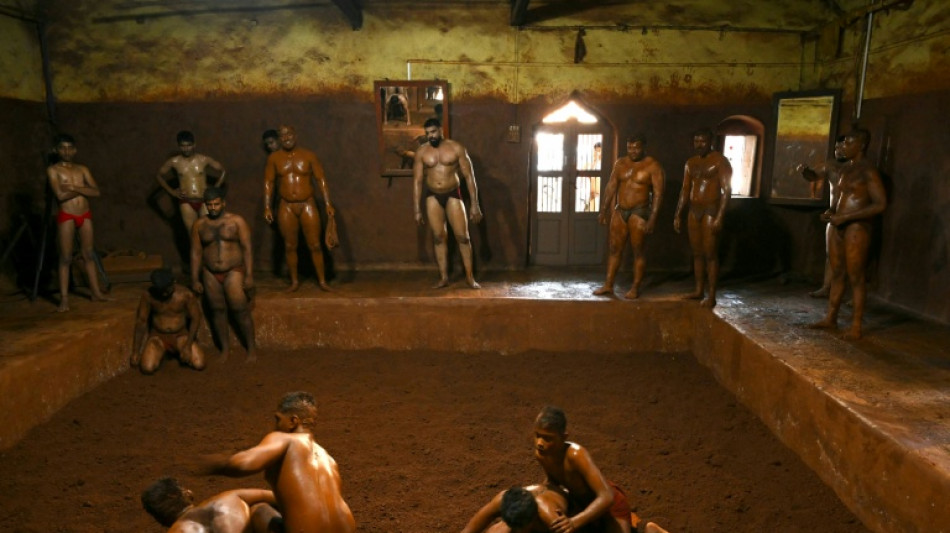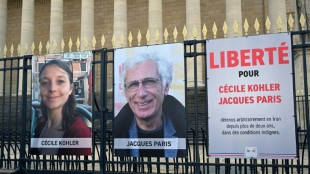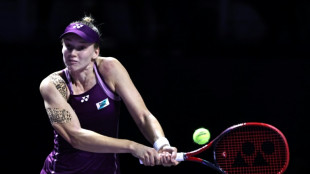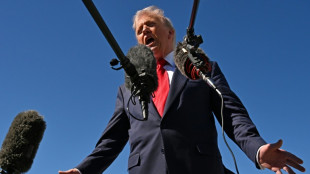
-
 BMW reports rising profitability, shares jump
BMW reports rising profitability, shares jump
-
Bolivia Supreme Court orders release of jailed ex-president Jeanine Anez

-
 Wall Street stocks rise after positive jobs data
Wall Street stocks rise after positive jobs data
-
'Hostage diplomacy': longstanding Iran tactic presenting dilemma for West

-
 Rybakina stays perfect at WTA Finals with win over alternate Alexandrova
Rybakina stays perfect at WTA Finals with win over alternate Alexandrova
-
Le Garrec welcomes Dupont help in training for Springboks showdown

-
 Brussels wants high-speed rail linking EU capitals by 2040
Brussels wants high-speed rail linking EU capitals by 2040
-
Swiss business chiefs met Trump on tariffs: Bern

-
 Spain's exiled king recounts history, scandals in wistful memoir
Spain's exiled king recounts history, scandals in wistful memoir
-
Wall Street stocks steady after positive jobs data

-
 Trump blasts Democrats as government shutdown becomes longest ever
Trump blasts Democrats as government shutdown becomes longest ever
-
Indian pilgrims find 'warm welcome' in Pakistan despite tensions

-
 Inter and AC Milan complete purchase of San Siro
Inter and AC Milan complete purchase of San Siro
-
Swedish authorities inspect worksite conditions at steel startup Stegra

-
 Keys withdraws from WTA Finals with illness
Keys withdraws from WTA Finals with illness
-
Prince Harry says proud to be British despite new life in US

-
 EU strikes last-ditch deal on climate targets as COP30 looms
EU strikes last-ditch deal on climate targets as COP30 looms
-
Stocks retreat as tech bubble fears grow

-
 Shein opens first permanent store amid heavy police presence
Shein opens first permanent store amid heavy police presence
-
West Indies edge New Zealand despite Santner brilliance

-
 French pair released by Iran await return home
French pair released by Iran await return home
-
German factory orders up but outlook still muted

-
 Death toll tops 100 as Philippines digs out after typhoon
Death toll tops 100 as Philippines digs out after typhoon
-
Attack on key city in Sudan's Kordofan region kills 40: UN

-
 'No one could stop it': Sudanese describe mass rapes while fleeing El-Fasher
'No one could stop it': Sudanese describe mass rapes while fleeing El-Fasher
-
Champagne and cheers across New York as Mamdani soars to victory

-
 Medieval tower collapse adds to Italy's workplace toll
Medieval tower collapse adds to Italy's workplace toll
-
BMW boosts profitability despite China, tariff woes

-
 South Africa's Wiese wary of 'hurt' France before re-match
South Africa's Wiese wary of 'hurt' France before re-match
-
Beyond limits: Croatian freediver's breathtaking record

-
 Tottenham supporting Udogie after alleged gun threat in London
Tottenham supporting Udogie after alleged gun threat in London
-
Thunder roll Clippers to stay unbeaten as SGA keeps streak alive

-
 In appeal, Australian mushroom murderer alleges 'miscarriage of justice'
In appeal, Australian mushroom murderer alleges 'miscarriage of justice'
-
Toyota hikes profit forecasts 'despite US tariffs'

-
 Ex-France lock Willemse challenges Meafou to become 'the bully'
Ex-France lock Willemse challenges Meafou to become 'the bully'
-
Ukrainians to honour sporting dead by building country they 'died for': minister

-
 At least 7 dead after UPS cargo plane crashes near Louisville airport
At least 7 dead after UPS cargo plane crashes near Louisville airport
-
US Supreme Court hears challenge to Trump tariff powers

-
 US government shutdown becomes longest in history
US government shutdown becomes longest in history
-
India's Modi readies bellwether poll in poorest state

-
 Green goals versus growth needs: India's climate scorecard
Green goals versus growth needs: India's climate scorecard
-
Where things stand on China-US trade after Trump and Xi talk

-
 Sri Lanka targets big fish in anti-corruption push
Sri Lanka targets big fish in anti-corruption push
-
NY elects leftist mayor on big election night for Democrats

-
 Injured Jordie Barrett to miss rest of All Blacks tour
Injured Jordie Barrett to miss rest of All Blacks tour
-
Asian markets tumble as tech bubble fears grow

-
 Pay to protect: Brazil pitches new forest fund at COP30
Pay to protect: Brazil pitches new forest fund at COP30
-
Iraq's social media mercenaries dying for Russia

-
 Young leftist Trump foe elected New York mayor
Young leftist Trump foe elected New York mayor
-
Concerns at ILO over expected appointment of close Trump advisor


Rooted in the earth, India's traditional mud wrestling thrives
Crowds cheer as muscular men in tight loincloths slap sacred scented soil on their bulging thighs and arms for a mud wrestling bout in India.
"When we fight, we sweat," said 33-year-old Mauli Jamdade, a wrestling star in Maharashtra state, rubbing red-brown earth onto his body for each clash.
"The mud gives us grip and helps us grapple better."
Unlike conventional wrestling matches played on mats with regulated draws, India's mud wrestling is more raw -- but has been the training ground for Olympic success.
This style of wrestling, known as "kushti" or "dangal", has millennia-old roots but emerged during the period of India's Mughal rulers in the 16th century, blending traditional hand-to-hand combat with Persian martial arts.
There are no blows or kicking, but plenty of throws to the ground, and it remains hugely popular.
It took Jamdade over 15 minutes to defeat his rival, starting with a slow circling dance then twisting, turning and locking arms, before he pinned him down.
The bout ends when one wrestler pins his opponent's back to the mud, irrespective of how long it takes.
- From mud into the Olympics -
Both men and women Indian wrestlers have won medals at the Olympics and Commonwealth Games in the more regulated form of the sport.
But it is the mud, not mat, version that is popular in swathes of rural areas -- with supporters saying it is not just a spectacle but a tradition that many want to uphold.
Bank cashier Anil Harale ended his wrestling career after injuring his leg, but after work still slips out of his office clothes for a dirty wrestle.
"I miss it," said the 46-year-old, who hopes his "unfulfilled dream" will be realised by his teenage son, an aspiring wrestler.
Wrestler KD Jadhav, who took bronze at the 1952 Olympics -- the first Indian to win an individual Olympic medal -- began his sporting career as a mud wrestler in Kolhapur, a city in Maharashtra.
"It is from mud that wrestlers reach the Olympics," said excited fan Sachin Mote, among hundreds cheering the wrestlers at a bout.
- Mud, milk, oil -
Kolhapur is a core base of the sport with its centuries-old residential gymnasiums known as talims.
Jamdadejoined the Gangavesh talim aged 14.
A picture of the Hindu monkey god Hanuman -- a deity worshipped by wrestlers for his strength and devotion -- gazes over waist-deep pits where the soil is dug.
The earth is mixed with turmeric, yoghurt and milk, as well as neem tree leaves and oil, before it is ploughed and smoothened across the ring.
For the wrestlers, the soil is sacred.
"It is everything," said Jamdade. "There is nothing without it."
More than a hundred wrestlers -- some as young as 10 -- train at the talim.
It is an austere life. The rigorous training includes waking up before dawn, running, hundreds of push-ups, rope climbing and grappling.
Tobacco and alcohol are strictly prohibited, phone usage is restricted and pre-marital relationships are considered a distraction.
- 'Never end' -
For Jamdade, the first year at the talim was all about gaining weight -- and that is an expensive affair.
"There are people who weigh 125-130 kilos (275-285 pounds)," he said.
"To fight with them, and match their strength, I need to be at least 120 kilos."
So when he is not in the ring or training, Jamdade focuses on eating.
That includes at least five kilos of goat meat each week, some 70 egg whites, 24 apples, leafy vegetables and dry fruits.
He washes that down with at least 21 litres of milk, 14 litres of sweet lemon juice and a protein shake made with almonds, cashews, honey, cardamom seeds, honey and milk.
His monthly food bill totals $350 but the prize money he has won helps his family, who are from a poor farming background.
Winnings range from a few hundred dollars to $1,700 -- more than the annual average income of an agricultural household in India.
While the popularity of more organised wrestling on mats has grown, Jamdade believes mud bouts have a safe future as a core part of village fairs.
"Fairs will always continue," he said. "Mud wrestling will never end."
K.Sutter--VB




